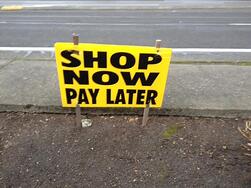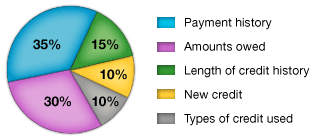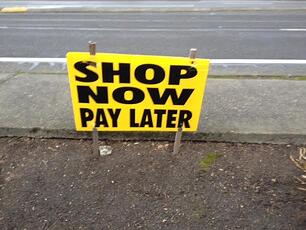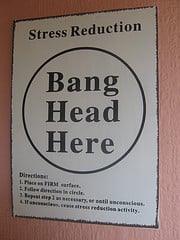 Dealing with debt collectors is not easy, but it can be done. Here are a few tips on how to deal with debt collectors.
Dealing with debt collectors is not easy, but it can be done. Here are a few tips on how to deal with debt collectors.
Debt collectors have one purpose: To get you to pay up...period! Many debt collectors are paid a percentage or commission based on how much they can get you to pay, so you need to be prepared when they call.
As you probably already know, the first tactic a debt collector will do is to call, and call, and call!
Oh sure, there are laws that are supposed to protect us from harassing debt collectors, but they don't seem to worry about them. So what can you do?
The Fair Debt Collection Practices Act (FDCPA) spells out what a debt collector can and cannot do. Here are just a few of the limits a debt collector can take:
A debt collector is prohibited from calling you at inconvenient times or places, such as your place of employment or business. They are not to call before 8am or after 9pm.
Contrary to popular belief, not all debt collectors are mean, nasty or uncaring people. Many are very professional and even courteous, but as with any group, there are some who are very disgusting individuals.
After many years of helping people deal with debt and debt collectors, I've found that it rarely helps to talk or try to explain your situation to a debt collector. Remember, they are going to try to get you to either send money or OK a check-by-phone payment or payments.
If you know the address of the debt collector, they you can mail a letter stating that they are to cease calling you. By law (FDCPA), once the debt collector has received the letter, they must cease calling or face some hefty fines!
While writing the letter to a debt collector usually works fine, there are some who ignore the letter and continue to call (most via a computerized dialer). If they do, start a log of the date and time they called. Mail your letter via Priority Mail or Certified Mail in order to have a record of it being delivered.
Next, contact your state's attorney general's office to file a complaint. The best way is to go online. For example, if you live in my state of Oregon, you would go to:
Oregon Department of Justice...Consumer Protection
You could also file a complaint with the Federal Trade Commission as well.
Need help with what to say in the letter? Click below:
One more thing...as long as the account is with your original creditor (say Visa or Master Card), they can call on delinquent accounts. It was somewhere all of the fine print when you signed up for the card! But, you don't have to take their calls and after a couple of months they will most likely farm your account out to a collector.
There are many other UNLAWFUL PRACTICES that a debt collector cannot do. A debt collector cannot...
- use threats of harm or violence
- use obscene language
- falsely claim to be an attorney (if in fact they are not)
- misrepresent the amount you owe
- threaten with legal action if in fact they do not take legal action
- threaten or try to scare you into believing they can take property that you own when in fact they have no claim
- falsely represent themselves as a government official
What can a debt collector legally do to collect the debt?
After the debt collector has sent numerous letters and has received the cease calling letter, you may not hear from them for many months. Don't assume that the debt is going to go away!
You may get a knock at the door one evening and a police officer or someone employed by the court will serve you a summons. Yes...very scary, but don't panic.
I've written several articles about what to do if you receive a summons, but here are the highlights:
- 1. Don't ignore the summons. It will not go away on it's own.
- 2. Contact the attorney who filed the claim for the creditor and find out if they are willing to negotiate something on the debt.
Not sure how to do that?
Trying to negotiate a settlement for a lower amount for less than the current balance is not a simple matter. For a few tips to help, click below:
Depending on several factors, you may be able to get a sizable reduction of the balance due. If you could use some help, let us know. We've been helping clients resolve debt issues for many years.
Yes, dealing with debt collectors can be annoying and frustrating, but you can put a stop to the calls and possibly negotiate a settlement for less than the amount you owe. But, there are times when a debt collector may decide to go after a JUDGMENT in order to get a WRIT OF GARNISHMENT.
If you are employed and receive W-2 income, a debt collector and/or creditor can receive a garnishment of your wages. In most states, they can garnish 25% of your net, take-home pay. Let's say you bring home $2,000 a month. Your payroll officer must send them $500 each month until the entire debt is repaid!
YOU DON'T HAVE TO LET THAT HAPPEN!
Most of our clients who call us AFTER they received the notice of garnishment from their employer admit that they just didn't do anything about the summons.
If this is you, we may be able to help stop the garnishment, but time is of the essence. Once a garnishment is in place, many debt collectors and/or creditors are not willing to accept a settlement or repayment plan as they feel they have your "cornered".
Of course, if all else fails, you may need to consider seeking BANKRUPTCY PROTECTION from your creditors. Losing 25% of your income is just not possible for most people who have already suffered a severe financial setback. Bankruptcy may be your best option.
Photo credit: I actually took this photo myself outside a major retailer. Kind of says it all, doesn't it!




 Living in Texas (I grew up in Dallas) has a lot of advantages, but none as important as protection from debt collectors.
Living in Texas (I grew up in Dallas) has a lot of advantages, but none as important as protection from debt collectors.




 Debt collectors are paid to get you to pay up.
Debt collectors are paid to get you to pay up. A wage garnishment because of unpaid bills can be devastating!
A wage garnishment because of unpaid bills can be devastating! One of the most commonly asked question we get here at Debt Relief NW, Inc. is…
One of the most commonly asked question we get here at Debt Relief NW, Inc. is…

